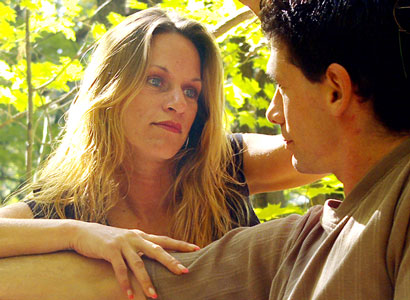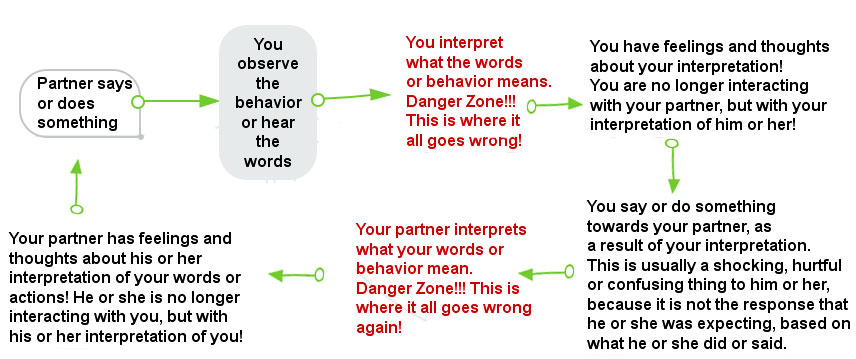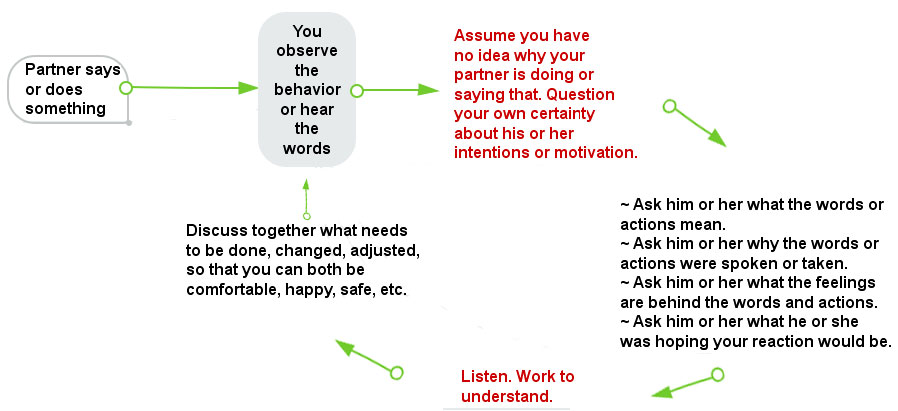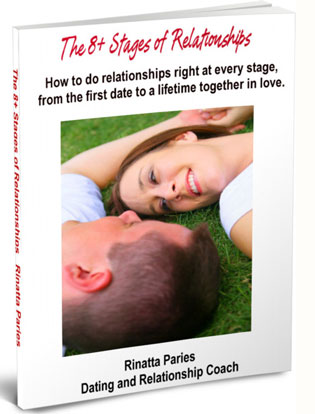 The biggest complaint I hear from individual clients and the couples I coach goes something like this:
The biggest complaint I hear from individual clients and the couples I coach goes something like this:
Our relationship hurts too much. My partner keeps trying to hurt my feelings, criticize me, or tell me how I am not doing or being enough. Then I do things to hurt him (or her) back. I feel bad about being hurt and hurting! We spend too much time fighting or avoiding fighting by walking on eggshells, and not enough time enjoying each other. I want this to stop!
Here’s what I tell every one of my clients, whether we are talking about their partners, spouses, the people they date, their kids, their bosses, their co-workers, their family members or their friends:
You are not being hurt by the person you are interacting with. You are causing that hurt to yourself through your interpretation of his or her actions! What’s worse, you don’t know this is happening. You are stuck in a vicious cycle.
Take a look at the infographic of the vicious cycle, which I will explain below, to help you understand what I mean:

What happens in the vicious cycle that causes so much hurt in all relationships:
- Your partner, boss, child, friend, neighbor, etc., says or does something.
- You observe the behavior or hear the words.
- You interpret the meaning of the words or behavior. Danger Zone!!! This is where it all goes wrong!
- You have feelings and thoughts about your interpretation! You are no longer interacting with your partner, but with your interpretation of him or her!
- As a result of your interpretation, you say or do something towards your partner. This is usually shocking, hurtful or confusing to him or her, because it is not the response that he or she was expecting, based on what he or she did or said.
- Your partner interprets your words or behavior. Danger Zone!!! This is where it all goes wrong again!
- Your partner has feelings and thoughts about his or her interpretation of your words or actions! He or she is no longer interacting with you, but with his or her interpretation of you!
- Based on the above, your partner says or does something, and around and around you go!
Can you see the point where pain is created for each of you in this vicious cycle? It’s in the interpretation stage!
When others, especially those close to us, say or do things, we are certain that we know their intentions. However, we are almost always wrong! We are convinced that we are excellent mind readers, when in fact we are not.
What most people don’t realize is that the closer you are to someone, or the more emotionally invested you are in a situation’s outcome, the less accurately you interpret what is going on with him or her!
By embracing this one truth, not only can you stop creating pain in your closest relationships, but you can get along better with everyone you interact with.
Take a look at the infographic of the cycle of understanding, which will tell you specifically how to stop pain and conflict in your close relationships. Look for an explanation below.

What to do to stop pain and conflict by practicing the cycle of understanding in your closest relationships (and in any situation where you deeply care about the outcome):
- Your partner, boss, child, friend, neighbor, etc., says or does something.
- You observe the behavior or hear the words.
- Assume you have no idea why your partner is doing or saying that. Question your certainty about his or her intentions or motivation.
- ~ Ask him or her the meaning of the words or actions.
~ Ask him or her why the words or actions were spoken or taken.
~ Ask him or her what the feelings are behind the words and actions.
~ Ask him or her what he or she was hoping your reaction would be. - Listen. Work to understand.
- Discuss what needs to be done, changed, adjusted, so that you can both be comfortable, happy, safe, etc.
In this alternative way of interacting, can you see how your partner’s outside input happens only once? The rest of the process is a cycle of understanding and seeking a resolution to this input.
Not only will this process avoid hurt in the relationship, but it will bring you closer together. How? The core of intimacy, the thing most sought after in close relationships, is understanding one another.
The less you react to each other and the more you work to understand each other, the closer you will be.
[stextbox id=”info”]If this seems hard to apply to your dating or relationship situation, I can help by coaching you individually or both of you as a couple.
Try working with me as your coach in a sample individual or couples Get Clarity Coaching Session.
Go here to find out more about the Individual Sample Get Clarity Coaching Session or go here to find out more about Couples Sample Get Clarity Coaching Session.[/stextbox]

{ 1 comment }
This is great because I’ve been having this exact situation in my marriage. My husband had an affair. I’m a mess and I’ve been compulsively researching everything I can get my hands and eyes on to understand how this could have happened. In the beginning I did the usual screaming and crying, which was new for me since for some reason I have never raised my voice in my life. My kids have made jokes about it since they have all grown up. They would get together and say lets see if we can make Mom yell and we’d all have a good laugh about it. Well, I found out what it takes to get me there. But for months now I’ve been trying to have calm discussions about issues and he always goes into defensive mode. After months of not understanding why he couldn’t get passed the defensive mode and into the productive mode I finally asked the right question. I had just asked him if he felt it would be a good time to talk with me about a trigger I was repeatedly having and he went right into defensive mode again. So I asked him what he just heard me say. His response was that all he heard me say was what a loser he was, what an asshole he’s been and on and on. It was such an eye opener for me. Clearly that wasn’t what I had just said, but that’s what his interpretation of what I said was for him. Now trying to find a safe way to present this information to him without his defensive knee jerk kicking in will be the trick, but thank you very much for the information.